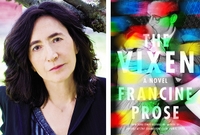"I have never seen you without thinking that I should like to pray to you," says the poet Rilke. The object of his devotion is the astonishing Lou Andreas-Salomé—the woman who played muse not only to Rilke, but also to Nietzsche and Freud. The idea of the muse seems an initially quaint, if not flatly sexist charge. Acclaimed novelist Prose (Blue Angel, etc.) confronts that honestly when she asks: "Doesn't the idea of the Muse reinforce the destructive stereotype of the creative, productive, active male and of the passive female?" Politically incorrect or not, the muses, as Prose presents them, genuinely "illumine and deepen the mysteries of Eros and creativity, as each Muse redraws the border between the human and the divine." In nine biographical narratives, Prose examines a range of relationships between artists and the women who gave them their divine spark. Though the artists, among them Lewis Carroll, Salvador Dalí and John Lennon, can easily be viewed through the lens of obsessional pathology, Prose makes a remarkable case for the exceptionality of these women in their own right. Lee Miller for example was not merely the muse to Man Ray, but an accomplished photographer, and Suzanne Farrell, Balanchine's muse, a virtuosic ballerina. Prose's project is to probe the mystery of inspiration, not to solve it once and for all: "one difference between magic and art is that magic can be explained." From Samuel Johnson's caretaker and trusted friend Hester Thrale to Dalí's wife, Gala, Prose demonstrates the strength and unique quality of influence each muse had on her artist. (Sept. 20)


